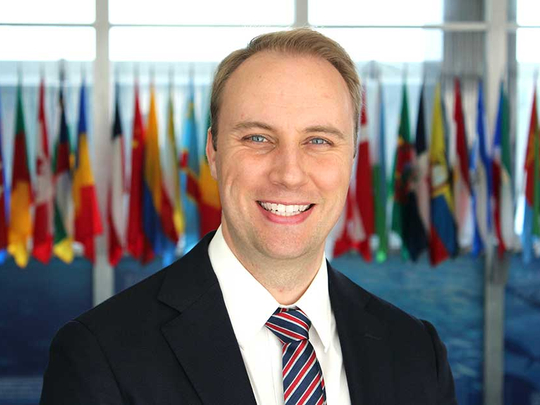
Dubai: The United States’ comprehensive peace plan, which will “benefit” both Israelis and Palestinians, will be unveiled when it is ready and the time is right, a senior US official told Gulf News. In an email interview, Christiaan K. James, spokesman of the Bureau of Near Eastern Affairs at the US State Department, also said Washington takes allegations of chemical weapons use by the Syrian regime very seriously, and is working with its partners on the ground to investigate. Excerpts from the interview:
Last week, Russia vetoed a Western bid for the UN Security Council to call out Iran for failing to prevent its weapons from falling into the hands of Yemen’s Al Houthi militia. Following this, the US threatened unilateral action against Iran. What exactly does your government intend to do against Tehran?
The US continues to push back on the totality of Iran’s malign activities in the region and calls for an end to Iranian behaviour that threatens peace and stability. Iran continues to be the world’s leading state sponsor of terrorism and is responsible for exacerbating multiple conflicts throughout the region, [making] provocative threats against its neighbours, and [engaging in] widespread human rights abuses. We continue to work extensively with like-minded countries, such as our Gulf partners, Israel, and others, to deter and disrupt Iranian threats. Our cooperation includes military and diplomatic efforts to prevent Iranian weapons shipments and to interdict missile and other advanced weapons technology destined to and from Iran.
Washington has said it has evidence Syria has used chlorine gas in attacks in recent weeks. When it accused the Al Assad regime of using the nerve gas sarin last year, President Trump ordered air strikes. Can we expect the US to take punitive military action against the regime to deter future use of chemical weapons?
We are monitoring the situation closely. As the President showed last April, he is willing to look at all options; however, I’m not going to speculate about potential policy responses. We take allegations of chemical weapons use very seriously, and we are working with our partners on the ground to investigate. We are working with the international community to ensure the Al Assad regime fulfils its international obligations to abandon its chemical weapons programme and to hold perpetrators to account.
What is America’s view of the endgame in Syria, as the conflict enters its eighth year, with close to half a million dead?
Our focus must remain on the UN-led political process in Geneva and we will remain engaged with the UN and other parties, including Russia, to encourage all possible efforts to advance the political solution to the conflict through the full implementation of a new constitutional process, and free and fair presidential and parliamentary elections under UN supervision — in accordance with UNSC Resolution 2254 and in the Da Nang Statement issued by Presidents [Donald] Trump and [Vladimir] Putin.
In May, the US plans to open a new US Embassy in occupied Jerusalem. In light of the other pro-Israel measures, does there still remain hope for a ‘two-state’ solution? There is substance to the Palestinian claim that the US cannot be seen as an honest broker, isn’t there?
We remain hard at work on our comprehensive peace plan, which will benefit both Israelis and Palestinians and will be unveiled when it is ready and the time is right. We are ready to discuss Palestinian concerns and priorities with President [Mahmoud] Abbas and his team. We hope the Palestinians will be willing to come back to the table.
What exactly is America’s stance on planned elections this spring in Libya? Is Washington fully backing the UN-backed process, as outlined in by UN envoy Gassan Salamé’s ‘Action Plan’?
The United States’ goal in Libya remains the same: A unified, secure, and prosperous Libya under one inclusive, effective, and accountable government in Tripoli that protects the rights of all in Libya. The US, together with our international partners, fully supports UN Special Representative Salamé’s efforts to help Libyans negotiate amendments to the Libyan Political Agreement and lay the groundwork for elections in 2018.
General Joseph L. Votel told Gulf News last month the US was in the ‘consolidation phase’ in its fight against Daesh. Presumably, the Syrian Democratic Forces militia is your ally in this phase. How is Turkey’s intervention in Syria’s Kurdish north impacting US ability to fight Daesh in its remaining pockets in Syria?
On the impact of the situation in Afrin on the Global Coalition’s [anti-Daesh] campaign, Gen. Votel once again discussed this in the written testimony he submitted to the House Armed Services Committee as part of his open Congressional hearing. I would refer you to the section on Afrin on page 19, excerpted below:
“ ... Though we have no relationship with YPG fighters in Afrin, who previously cooperated with Russia and the regime, these [Turkish] operations directly impact our ability to affect a lasting defeat against Daesh through the SDF. Many fighters in the SDF have familial ties to the Kurds in Afrin, and they are now forced to choose between completing operations against Daesh fighters in the MERV [Middle Euphrates River Valley] and assisting their fellow Kurds in northern Syria.
“Our alliance with Turkey is paramount, and we will continue to assist the Turkish military in countering the PKK and other VEOs [Violent Extremist Organisations] that threaten their border, but we must continue to urge restraint as their actions have clearly increased risk to our campaign to defeat Daesh.”












